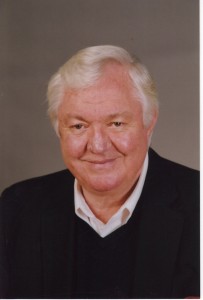 DOB: 1939
DOB: 1939
Address: 699 Queen Street,
later 706 Queen Street
Schools: Kitchener, Scott
Cairo, Paris, Moscow, the Amazon — Barrie Dunsmore has seen them all with a microphone in his hand and news report on his lips. But in 30 years as a globetrotting journalist, he never forgot his roots in Regina’s North Central.
Dunsmore was born in 1939, to parents who worked hard but brought in little money. His house growing up was actually an outbuilding of the 6th Ave United Church, a tiny tar-papered structure that his parents rented for $10 a month.
“In the winter it was really, really cold,” says Dunsmore, recalling that the reservoir of water in their wood stove would often freeze overnight. “We had frost on the windows that was two inches thick from mid-December through March.” When the family later moved to a true house, with a furnace and electric stove, he considered it “a huge move up in the world.”
Dunsmore and his family were far from alone in their poverty – but they and their neighbours didn’t let a lack of wealth dampen their spirits.
“We were pretty much all in the same boat,” he says. “It was really tough, and people were just eking out an existence and doing what they could to stay alive. And yet there was a community spirit.”
That sense of community spirit, of neighbours who would “rally around and help each other,” is something that has stayed with Dunsmore. The ideal of togetherness was embodied in his father who, after digging their house out after snowstorms, would head over to do the same for a nearby elderly couple. It left its mark on Dunsmore, giving him “an appreciation for community and friends and family, which in a sense meant a lot more than the trinkets of life, of which we had very few.”
Though he never dreamed of being able to afford university, the education he did receive – at Kitchener elementary and Scott Collegiate – was a high point of Dunsmore’s youth. He remember the schools as having “no shortage of really bright people,” and he thrived under the instruction of enthusiastic teachers.
Outside of school, Dunsmore and his friends found their fun where they could. They lived in a neighbourhood of outhouses and horse-drawn delivery wagons; there were few playgrounds, let alone malls or theatres. But there will still movie showings, played in the United Church Sunday school by an old man with projector, some silent films, and a desire to entertain the local kids. And there were sports – whether it was baseball in one of the many empty lots or hockey on the rink by Imperial School, the games were “a huge part of the life experience” growing up in North Central, says Dunsmore.
Sports weren’t Dunsmore’s only interest. As a teenager, he performed across Canada and the U.S. in the Saskatchewan Golden Jubilee Choir. But the intest that would shape his future developed near the end of his time in North Central, when he took an after-school job with CKRM Radio. When Dunsmore graduated high school a year later, CKRM took him on full time as an announcer and disk jockey. It was the start of a career in broadcasting that would last almost four decades.
In September 1957, Dunsmore moved out of the family home to take a job in Brandon, Manitoba,which gave him his first chance to work in television. TV became his new focus, and he moved on to hosting and reporting jobs in Montreal and Toronto. During his time in Toronto, Dunsmore became friends with a young news anchor named Peter Jennings, and when Jennings went to the US in 1964 to work for ABC News, he quickly helped Dunsmore get hired as well.
Originally hired to cover the Vietnam War, Dunsmore instead found himself unexpectedly shuffled into a job as a Paris-based roving reporter. Since ABC had no Middle East bureau, Dunsmore found himself frequently flying in report from the volatile region. In 1967, he travelled with Israeli troops during the Six-Day War, starting off a long specialization in Middle Eastern reporting.
Dunsmore later turned his focus to the Cold War and US-Soviet relations, and starting report from hotspots all around the globe. He covered the fall of the Berlin Wall and the first Gulf War, among many other historic events. As his job put him into contact with poor and marginalized people across the world, Dunsmore found his experiences growing up in North Central gave him the empathy to understand their situations.
“I had a great appreciation for poverty when I could see it, because oftentimes it wasn’t dramatically different than I had grown up in. And I think it does give you a different perspective than if you’d been going to prep school,” he says.
In 1992, Dunsmore returned to the US to work as a diplomatic correspondent out of Washington. But even as he took the job, he knew his career was ending; he was an expert on the Cold War, which had ended, and the Middle East, where things had become relatively calm. In late 1995, he retired and headed for Harvard University, where he spent a year teaching and researching the effects of live TV coverage of war. He now lives in Charlotte, Vermont, where he writes a newspaper column, teaches occasional college classes, and does regular commentary on public radio.
“I work almost as hard but I don’t make any money; that’s the difference,” he says of his retirement.
Though Dunsmore doesn’t get home to Regina much these days, “I still have a soft spot in my heart for (North Central),” he says. “The memory of that part of town, particularly in those really early years, has stayed with me in a mostly positive way.”
